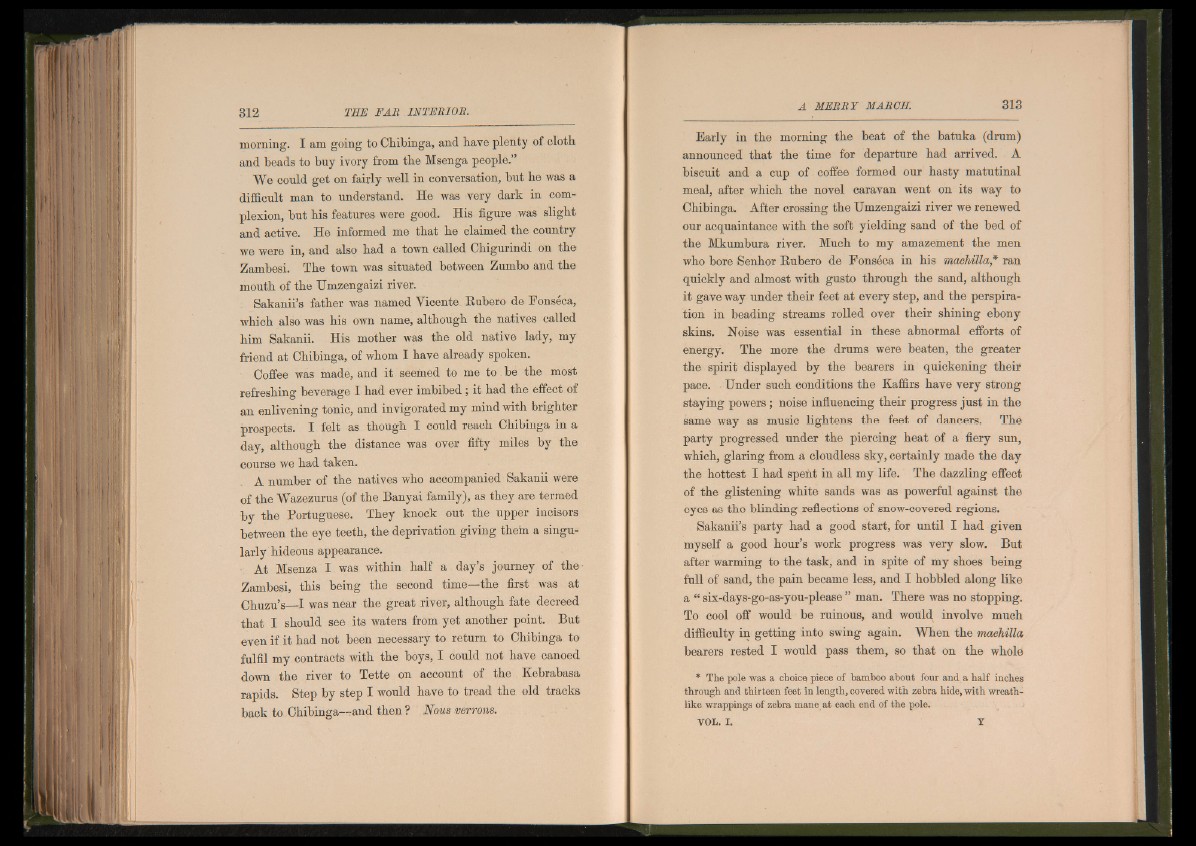
morning. I am going to Chibinga, and have plenty of cloth,
and beads to buy ivory from the Msenga people.”
We could get on fairly well in conversation, but be was a
difficult man to understand. He was very dark in complexion,
but bis features were good. His figure was slight
and active. He informed me tbat be claimed tbe country
we were in, and also bad a town called Cbigurindi on tbe
Zambesi. Tbe town was situated between Zumbo and tbe
moutb of tbe Umzengaizi river.
Sakanii’s father was named Yicente Rubero de Fonseca,
which also was bis own name, although tbe natives called
him Sakanii. His mother was tbe old native lady, my
friend at Chibinga, of whom I have already spoken.
Coffee was made, and it seemed to me to be tbe most
refreshing beverage I had ever imbibed ; it bad tbe effect of
an enlivening tonic, and invigorated my mind with brighter
prospects. I felt as though I could reach Chibinga in a
day, although the distance was over fifty miles by the
course we had taken.
A number of the natives who accompanied Sakanii were
of the Wazezurus (of the Banyai family), as they are termed
by the Portuguese. They knock out the upper incisors
between the eye teeth, the deprivation giving them a singularly
hideous appearance.
At Msenza I was within half a day s journey of the
Zambesi, this being the second time—the first was at
Chuzu’s—I was near the great river, although fate decreed
that I should see its waters from yet another point. But
even if it had not been necessary to return to Chibinga to
fulfil my contracts with the boys, I could not have canoed
down the river to Tette on account of the Kebrabasa
rapids. Step by step I would have to tread the old tracks
back to Chibinga—-and then ? Nous verrons.
Early in the morning the beat of the batuka (drum)
announced that the time for departure had arrived. A
biscuit and a cup of coffee formed our hasty matutinal
meal, after which the novel caravan went on its way to
Chibinga. After crossing the Umzengaizi river we renewed
our acquaintance with the soft yielding sand of the bed of
the Mkumbura river. Much to my amazement the men
who bore Senhor Rubero de Fonseca in his machilla* ran
quickly and almost with gusto through the sand, although
it gave way under their feet at every step, and the perspiration
in beading streams rolled over their shining ebony
skins. Noise was essential in these abnormal efforts of
energy. The more the drums were beaten, the greater
the spirit displayed by the bearers in quickening their
pace. Under such conditions the Kaffirs have very strong
staying powers; noise influencing their progress just in the
same way as music lightens the feet of dancers. The
party progressed under the piercing heat of a fiery sun,
which, glaring from a cloudless sky, certainly made the day
the hottest I had spent in all my life. The dazzling effect
of the glistening white sands was as powerful against the
eyes as the blinding reflections of snow-covered regions.
Sakanii’s party had a good start, for until I had given
myself a good hour’s work progress was very slow. But
after warming to the task, and in spite of my shoes being
full of sand, the pain became less, and I hobbled along like
a “ six-days-go-as-you-please ” man. There was no stopping.
To cool off would be ruinous, and would, involve much
difficulty in getting into swing again. When the machilla
bearers rested I would pass them, so that on the whole
* The pole was a choice* piece of bamboo about four and. a half inches
through and thirteen feet in length, covered with zebra hide, with wreath-
like wrappings of zebra mane at each end of the pole.
VOL. I. ¥